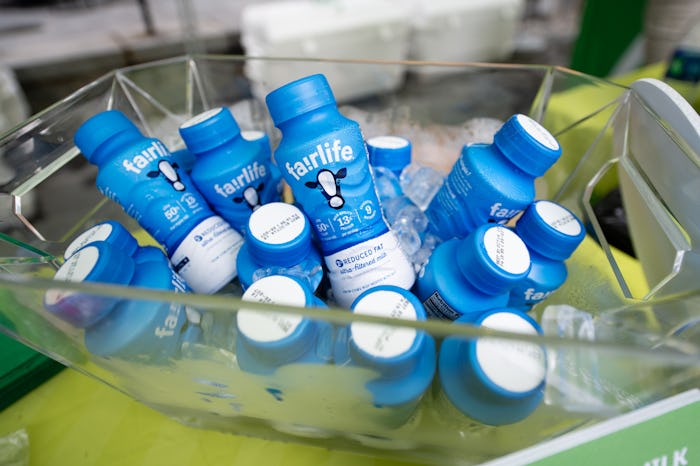Life

Are You Doomed To Be Dairy-Free Forever, Or Can Lactose Intolerance Go Away?
Milk is the absolute worst. However, it is one of my favorite foods on the planet. It gives us everything that is good in this life: cheese, cheese pizza, cream cheese, cheesecake, cottage cheese, and ice cream. But when I eat it? Ouch. I need to be prepared for a night of cramping and moaning if I don't have my trusty Lactaid handy. Needless to say, I'm lactose intolerant AF, and while I know this is just my life, I worry about my kids. Can you grow out of lactose intolerance?
Lactose intolerance is a tricky tummy trouble. It can be temporary, or it can be lifelong, according to the American Academy of Pediatrics (AAP).
"In some cases, lactose intolerance is temporary — if lactose intolerance develops after a viral illness or if it is associated with other conditions, like celiac disease," Pediatrician Anthony Porto, M.D., from the Yale School of Medicine, wrote for the AAP. However, those cases are few and far between. "More than likely, however, lactose intolerance is long-term," wrote Dr. Porto, which leaves most people no choice but to change their diet accordingly. The AAP added that there's also something called "developmental lactase deficiency," which can happen in preemies, but babies will usually grow out of that condition.
It's important to note that there's a big difference between a lactose intolerance and a dairy allergy, according to the Food and Allergy Research and Education Foundation (FARE). Chiefly, lactose intolerance is the inability of the body to break down the sugars in the milk (lactose) because the body doesn't produce the necessary lactase enzyme. A dairy allergy is an immune response to the proteins in milk. People who are lactose intolerant won't be happy if they eat dairy, but it won't kill them. Allergic reactions to dairy can range from mild presentations, like a rash or hives, to severe presentations such as anaphylaxis that must be treated with epinephrine, also known as an Epi-Pen.
You've probably heard that some kids grow out of allergies; according to FARE, it's possible. Mine grew out of a slew of them. But is lactose intolerance the same? Can you grow out of a lactose intolerance? Not likely, according to the American Academy of Family Physicians (AAFP). They wrote that primary lactose intolerance, or lactose intolerance that isn't secondary to illness or another condition, is with you for life.
Interestingly, if you are Asian or Indigenous to the Americas, you are about 85 percent more likely to be lactose intolerant than those of Northern European descent. The AAFP wrote that this is likely due to many generations of dietary manipulation, because they can already see the shifts in intolerance over the past few hundred years as a more global diet has taken root.
Fortunately, some of us find relief in Lactaid tablets, which are an over-the-counter lactase enzyme supplement that helps your body digest the creamy goodness, according to the AAP. I chew those chalky, vanilla-flavored disks like they're the key to life's happiness. However, some people still cannot easily digest dairy even with the tablets, and in that case, it's a good idea to talk to a nutritionist to make sure their diet is compensating for the lack of nutrients they would have received drinking milk or eating dairy products.
If you think your child is lactose intolerant, your pediatrician can perform a hydrogen breath test. Performed after they drink a glass of milk, it detects the levels of hydrogen in breath, which spikes in those people who suffer from lactose intolerance. It's not fun to worry about what's in your latte, or if you can have the mac and cheese, but it's usually manageable, even if you never grow out of it.